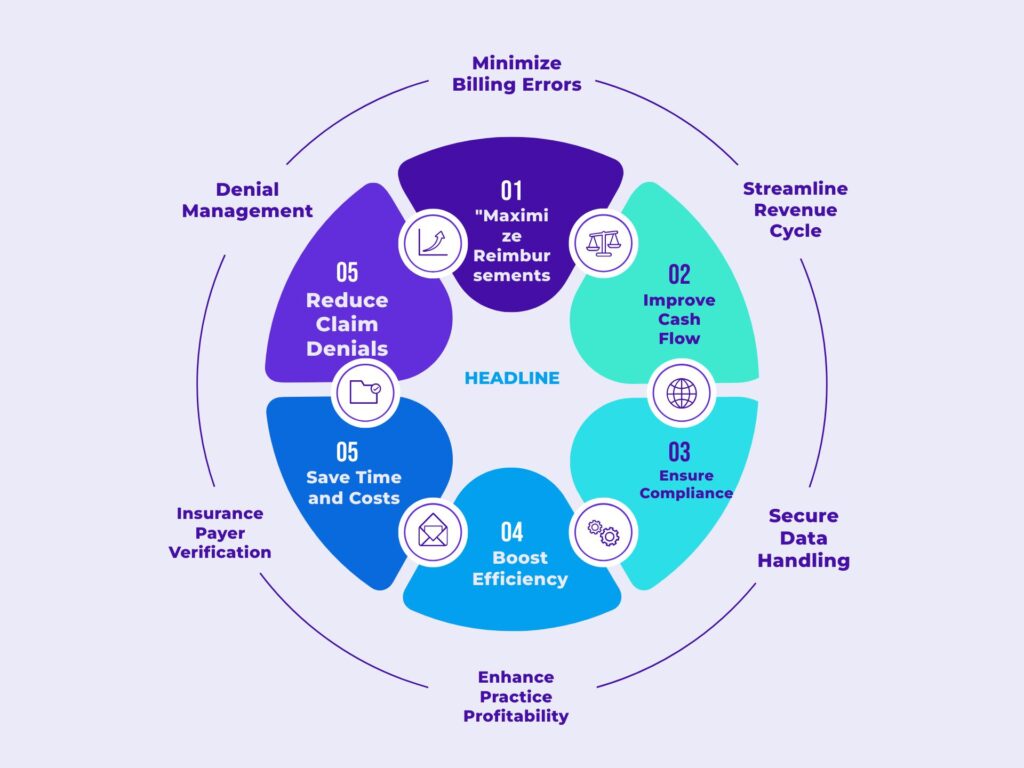The healthcare revenue cycle is fraught with complexities, and one of the most significant challenges providers face is managing Healthcare AR Denial Scenarios. These scenarios occur when claims submitted to insurance payers are denied, leading to delays in payments and increased administrative burdens.
What are AR Denial Scenarios in healthcare?
Healthcare AR Denial Scenarios are specific cases in which insurance companies refuse to process or pay claims submitted by healthcare providers. Denials can occur for a variety of reasons, such as inaccurate patient information, coding errors, or lack of prior authorization.
These denials significantly impact the billing process, causing financial losses and administrative burdens.
Top Types of AR Denial Scenarios in Healthcare
Technical Denials
They occur due to data entry errors, missing information, or formatting issues when submitting claims. Example: incorrect patient demographics or policy numbers.
Clinical waste
They occur when medical services are deemed unnecessary or not supported by documentation.
Example: Lack of supporting evidence for a medical procedure.

Denial of Authorization
They result from the lack of prior authorization or pre-certification for treatments.
Example: Lack of prior approval for expensive diagnostic tests. Rejection of duplicate requests
They happen when the same request is submitted multiple times.
Example: Resending a request without making the necessary corrections.
Refuse to send on time
Rejection given because the request was not submitted within the term set by the insurer.
Example: Applications submitted beyond the 90-day submission window.
Refusal to coordinate services
They occur when the primary payer is not correctly identified in multiple payer situations. Example: Submit a claim to the secondary insurer first.
The Impact of Claim AR Denial Scenarios on Healthcare Providers
Financial Consequences
Claim denials result in delays or lost revenue. Frequent denials force providers to invest more resources in reprocessing and follow-up, which impacts profitability.
Operational Challenges in AR Denial Scenarios
Staff must spend additional time identifying, appealing, and resolving denied claims, leading to inefficiency and potential burnout.
Patient Dissatisfaction
Patients may experience billing errors or unexpected charges, negatively impacting trust and satisfaction. Risks of non-compliance
Repeated claims errors can lead to audits, penalties or legal problems, especially in highly regulated environments.
Common Causes of Health Claim AR Denial Scenarios
1. Incorrect patient information
Errors in patient demographics or insurance details result in technical denials. It is essential to ensure correct data entry during the registration process.
2. Lack of documentation
Clinical denials often result from a lack or insufficient documentation justifying the medical necessity of the services provided.
3. Failure to obtain prior authorization
Denials occur when health care providers fail to obtain approval for specific procedures or medications.
4. Coding errors in AR Denial Scenarios
Incorrect or incompatible diagnostic and procedural codes result in denials. Regular coding audits can mitigate this risk.
5. Policy limitations
Some claims are denied for services that are not covered by the patient’s insurance plan.
6. Delayed deposit
Submitting claims after the deadline set by the insurer results in immediate denial, emphasizing the need for a simple submission process. Strategies for Handling Claim Rejection
Optimize Your Revenue Cycle with Claim Denial Solutions
Powerful Rejection Management System
- Implementing a dedicated denial tracking and tracking system ensures fast tracking and resolution.
- Staff Training
- Training billing and coding staff reduces errors and improves efficiency in submitting claims.
- Automated Processes
- Using automation to verify, code, and submit claims minimizes human error.
- Regular Audits
- Conducting routine audits helps identify trends in rejection, allowing providers to address root causes.
- Proactive Authorization
- Providing prior authorization for services reduces the risk of associated denials. Patient education
- Educating patients about their coverage and responsibilities reduces confusion and errors during claims processing.
Tools and technology to minimize claim rejection in AR Denial Scenarios
Request cancellation software
Automate error detection before claims are filed.
Revenue Cycle Management (RCM) systems.
It integrates all aspects of the revenue cycle, from registration to final payment.
Electronic Health Records (EHR)
Simplifies access to patient data, improves claims accuracy.
Artificial intelligence (AI) tools.
It analyzes denial patterns and provides predictive insights to reduce occurrences.

Billing portals in AR Denial Scenarios
Provides real-time updates on claim statuses, allowing for faster follow-up. The role of analytics in managing payment rejections in AR
Analytics can be a powerful ally in addressing AR payment denial scenarios in the healthcare sector. Using data analytics tools, providers can:
- Identify trends: Analyze denial data to uncover recurring issues.
- Anticipate risks: Use predictive models to predict potential denials.
- Optimize processes: Drive workflows based on insights from denial models.
Effectively managing AR Denial Scenarios in healthcare is essential to maintaining a steady revenue stream and ensuring patient satisfaction. By understanding the causes of waste and implementing strategic measures to prevent it, healthcare providers can significantly reduce administrative burden and improve financial performance.
Investing in the latest tools and technology, along with staff training and proactive policies, is key to mitigating claims waste. With a comprehensive approach, healthcare organizations can manage the complexity of claims waste and improve operational efficiency.
| AR Denial Scenario Suggested Solution |
| Incorrect patient details Verify information during registration |
| Missing documentation Ensure thorough documentation |
| Lack of prior authorization Obtain preauthorization for procedures |
| Coding mismatches Conduct regular coding audits |
| Policy exclusions Verify insurance coverage beforehand |
| Late submission Use automated claim submission tools |
The main types of claim rejections in healthcare AR Denial Scenarios
1.Technical rejections
Technical rejections are the simplest, usually caused by administrative or data entry errors. These errors can include incorrect patient demographics, invalid insurance policy numbers, or missing claim details.
Although they are easy to identify, they can significantly disrupt cash flow if not addressed immediately.
For example, submitting claims with typos in the patient name or policy number results in immediate denial. Correcting and resubmitting such requests takes time and can be avoided through rigorous verification processes.
2. Clinical waste
Clinical denials occur when payers dispute the medical necessity of a treatment or procedure. This often results from insufficient documentation to support the services provided. For example, if a diagnostic test or surgical procedure lacks a detailed justification, insurers may refuse payment. The consequences of clinical denials are serious, as they often require an extensive appeal process, which involves additional documentation and lengthy correspondence with the payer.
3. Refusal of Authorization
Denial of authorization occurs when providers fail to obtain prior approval for treatments or procedures that require prior authorization. These denials are especially common for expensive services such as MRI, surgery, or specialized medication.
Prior authorization requirements vary among payers, and noncompliance often results in automatic denials. Establishing a rigorous pre-authorization process can help avoid these rejections.
How to Manage and Prevent Healthcare AR Denial Scenarios
4. Rejection of duplicate requests
Duplicate applications are reported when the same application is submitted more than once without the necessary corrections. These rejections are usually the result of confusion or lack of coordination in the billing department.
Effective tracking and monitoring systems are essential to avoid the resubmission of already processed applications, saving time and resources.
5. Refusal of timely filing
Each paying agency sets a strict deadline for the submission of requests, usually between 30 and 180 days after the date of service. Failure to comply with these terms results in rejections that are often irreversible.
Delays in filing or processing applications are common causes of these rejections. Automating the application submission process is a critical step in solving this problem.
6. Coordination of denials of benefits
In cases where a patient has multiple insurance plans, failure to correctly identify the primary and secondary payer often results in denials. For example, if the secondary insurer receives the application before the primary insurer processes it, the application will be rejected.
Proper verification and coordination at the time of patient verification can alleviate this problem.

Common Causes of Health Claim AR Denial Scenarios
Inaccurate patient information
Inaccurate or incomplete patient information is one of the main causes of technical waste. For example, an outdated insurance policy number or a misspelled name may result in a claim being denied. Ensuring the accuracy of information during patient registration and implementing verification tools can reduce this risk.
Lack of documentation
Insufficient documentation to justify the medical necessity of services often leads to clinical denials. Providers must maintain detailed patient records, including doctors’ notes, diagnostic test results and treatment plans, to support claims.
Lack of prior authorization
Prior authorization requirements are becoming more and more stringent. Providers must confirm the approval of procedures or medications well in advance to avoid denials.
Coding errors
Medical coding errors, such as mismatched diagnosis and procedure codes or outdated codes, are a common source of denials. Training and regular audits for coding staff can help solve this problem.
Policy limitations
Submitting claims for services not covered by the patient’s insurance policy will result in denials. Checking the coverage details in advance helps to avoid such scenarios. Late Filing
Submitting claims on time is essential. Late filings are caused by inefficiencies in the billing process, but automated systems can help ensure that deadlines are met.
CONCLUSION
Claim denial scenarios in the healthcare industry are an ongoing challenge that healthcare providers must address to maintain financial stability and operational efficiency. Denials disrupt cash flow, strain administrative resources, and can lead to patient dissatisfaction if not managed effectively. By understanding the common types of denials (technical, clinical, authorization, and others), providers can take a proactive approach to minimizing their impact. Implementing robust denial management systems, leveraging advanced technologies such as automation and analytics, and ensuring staff are well trained in billing and coding are essential steps to addressing the challenges associated with denials. In addition, proactive communication with patients and rigorous documentation practices can help healthcare organizations prevent waste before it happens.
Executed strategy not only minimizes waste, but also improves compliance, increases patient satisfaction and strengthens the revenue cycle. Managing AR denial scenarios in healthcare with these tools and approaches ensures smoother operations and a more sustainable financial model.
FAQs
What is the impact of AR waste in healthcare organizations?
Payment refusals can lead to financial losses, increased administrative burden, compliance risks and patient dissatisfaction. It disrupts cash flow and takes a lot of time and effort to fix.
What technologies can help manage payment slips?
Technologies that help manage payment rejections include:
- Application cleaning software to detect errors before submission
- Revenue cycle management (RCM) systems to streamline processes
- Analysis tools to track traffic patterns and information
- Automated invoicing systems for timely submission
- AI tools for predictive analytics and denial prevention
Why is patient education important to reducing claim denials?
Educating patients about their insurance coverage, responsibilities and billing processes can reduce confusion and errors when filing claims.
Clear communication helps to avoid problems such as policy exclusions or poor coordination of benefits, minimizing the risk of denial.

